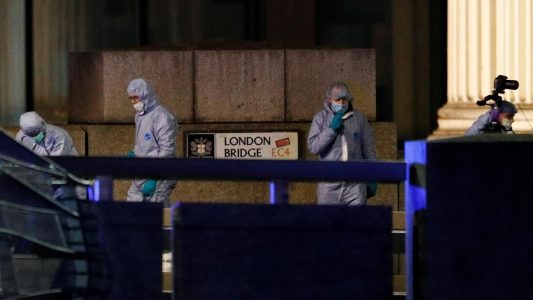
London Bridge terrorist plotted revenge for death of the Islamic State leader al-Baghdadi
London Bridge terrorist Usman Khan may have launched his attack after plotting revenge for the death of ISIS leader Abu Bakr al-Baghdadi, experts claim.
The terror chief was killed in October during a military raid on his home in Syria.
Once described as “one of the most evil men in history”, al-Baghdadi had a $25million bounty placed on his head in 2016.
Now, experts claim 28-year-old Usman Khan may have carried out yesterday’s terror atrocity in vengance.
Colonel Richard Kemp, ex-COBRA security committee chief, said: “If he turns out to be an Islamic terrorist, he was likely inspired by Islamic State.
“It is even possible his action was in revenge for al-Baghdadi’s death. It’s something ISIS has called for since the US Delta Force raid in Syria.”
It is also thought that Khan is ‘likely’ to have been one of 20,000 jihadi suspects on a UK watchlist.
Khan was automatically freed from prison a year ago and wearing an electronic monitoring tag.
Inspired by al-Qaida, he and others had plotted to bomb the London Stock Exchange and target other sites including the Houses of Parliament and the US Embassy, as well as then-mayor Boris Johnson , the Dean of St Paul’s Cathedral and two rabbis.
He was charged in December 2010 and convicted in February 2012 of terrorism offences, but was released from prison last December on licence.
Judge Mr Justice Wilkie gave the jihadist an indeterminate sentence with at least eight years, saying he should not be released until he was no longer a threat to the public.
Security sources said Khan was also taking part in a mandatory Government deradicalisation course called ‘Desistance and Disengagement’.
The Henry Jackson Society, a government think tank, found the number of terrorists or suspected terrorists who have been put on the government’s intensive “detoxification” scheme has almost tripled in a year.
Just 30 individuals attended DDP in 2016-17, its first year of operation – compare to 86 in 2017-18.
Dr Rakib Ehsan a research fellow at the Henry Jackson Society, said: “This attack will cast further doubt over the effectiveness of “deradicalisation schemes” including the Home Office’s Desistance and Disengagement programme.
“As an acolyte of Islamist hate preacher Anjem Choudary, Usman Khan was a hardened fundamentalist who remained a major threat to society after his release.
“Simply relying on ‘deradicalisation’ courses – however well-meaning – is insufficient.
“These individuals are devious and are often capable of faking progress in order to fool those tasked with deradicalising them – with potentially deadly consequences.”
Source: Mirror





